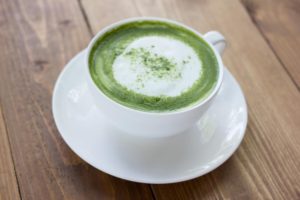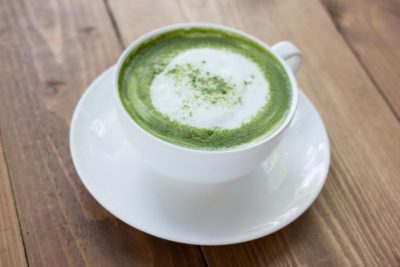One of the most common questions I get from my readers is ‘how much caffeine is present in Matcha?’ All forms of green tea including Matcha contain caffeine. Caffeine is an important component of Matcha and it clears drowsiness while refreshing the mind, body, and soul. The caffeine content of Matcha is a lot milder than that of coffee because it is combined with catechins and other wonderful compounds that make matcha so healthy and flavorful. Let us find out exactly how much caffeine is present in Matcha.
How much caffeine does Match tea contain?
 Matcha tea roughly contains about 25mg of caffeine per teaspoon. This is approximately 1/3rd the content found in regular brewed coffee. So, where coffee tends to make you jittery, Matcha leaves you with a clearer head. The reason behind this phenomenon is that Matcha caffeine content is small enough to be well-tolerated by most people. Additionally, the caffeine in Matcha is balanced by other ‘good’ compounds in it which enable a slower release of caffeine. So you don’t really get a ‘caffeine kick’ with Matcha like you do with coffee. In fact, the small amount of caffeine contained in matcha takes nearly 3-4 hours to be absorbed completely into the blood stream! Due to this slow release, you feel fresh and rejuvenated for hours with just one cup of Matcha.
Matcha tea roughly contains about 25mg of caffeine per teaspoon. This is approximately 1/3rd the content found in regular brewed coffee. So, where coffee tends to make you jittery, Matcha leaves you with a clearer head. The reason behind this phenomenon is that Matcha caffeine content is small enough to be well-tolerated by most people. Additionally, the caffeine in Matcha is balanced by other ‘good’ compounds in it which enable a slower release of caffeine. So you don’t really get a ‘caffeine kick’ with Matcha like you do with coffee. In fact, the small amount of caffeine contained in matcha takes nearly 3-4 hours to be absorbed completely into the blood stream! Due to this slow release, you feel fresh and rejuvenated for hours with just one cup of Matcha.
Here is a brief comparison of caffeine in matcha with that in other popular beverages
Comparative caffeine in different beverages
- 1 tsp of Matcha (1 gram approximately) has about 25-30 mg of Caffeine.
- 1 cup of brewed coffee about 150-200 mg of coffee.
- 1 cup of brewed green tea 35-70 mg of caffeine
- 1 cup of brewed oolong tea has about 50-75mg of caffeine
- 1 cup of brewed black tea has 60-90 mg caffeine
- 1 can of Coca Cola classic contains 32 mg caffeine while Diet coke contains nearly 42 mg!
If you are concerned about the caffeine content of Matcha, you can change your brewing style and the amount of powder you use in your recipes. If you like thicker tea (i) with a smoothie-like texture, then you might get anywhere between 25 to 120 mg of caffeine. On the other hand, lighter (Usucha style) matcha tea would contain up to 20 mg only.
What makes caffeine in Matcha better than other teas and coffee?
Good question.
All teas belong to the Camellia Sinensis genus and this includes white, green, black and oolong teas. They all contain caffeine which is one of the building blocks of the plant’s DNA.
In the case of Matcha, the minimal caffeine content works synergistically with its phytonutrients, catechins, antioxidants and amino acids for a slower release since the caffeine molecules bind with these nutrients. The result: instead of feeling instantly awake or excessively jittery like you do with coffee, you feel more energetic, focused and refreshed for a longer duration with Matcha. Your body gets the fuel it needs for the next several hours so your brain can entirely focus on the task at hand. Thus, Matcha gives you the energy to work for several hours without experiencing a crash or excess fatigue that is so characteristic of coffee. With Matcha, you will not experience any caffeine addiction since the slow time release does not cause a spike in insulin levels. Also, unlike coffee, Matcha does not cause an excess production of stress hormone cortisol that leads to unhealthy cravings, depression, and even weight gain.
Conclusion: Matcha tea leaves you awake, aware, and present
The effect of the caffeine in coffee and that in Matcha can be summarized using the following analogy: “The caffeine in coffee is like cold water splashing on your body on the coldest of winter days–it hits you and instantly awakens you, yet you are left shaking all over. The caffeine in Matcha, on the other hand, is like meditation. You relax completely and yet you are fully awake and aware. Your mind and body are completely in the present moment and you feel ready to take on the world!”
References
- https://www.matchasecrets.com/caffeine-in-matcha-tea-matcha-vs-coffee-what-you-need-to-know/
- http://www.breakawaymatcha.com/content/masterclass-in-matcha.pdf

